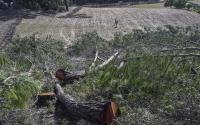Independent, 19 September 2001
"Smoking them out of their holes"? "Wanted dead or alive"? President Bush says that he wants justice, but the United States seems close to sanctioning hit squads and liquidation. A new policy for America, maybe – but it's an old policy in the Middle East where assassination, kidnapping and murder squads have been a normal part of local "justice" for decades.
Iran, Israel, Libya and Iraq have all employed killer squads to hunt down their enemies overseas. The Iranians twice sent teams to murder the Shah's last prime minister, Shahpour Bakhtiar, in Paris on the basis that he was planning a "terrorist" coup d'étât. The first gang killed a policeman and an elderly lady, but the second group, who were armed with knives, almost severed his head from his body.
Colonel Gaddafi openly admitted his determination to hunt down and kill the "terrorist stray dogs" of the Libyan opposition abroad, his gunmen murdering the most prominent of his opponents in Rome. Israel arranged the murder of the Palestinian Islamic Jihad leader, Fathi Shkaki, shot dead by motorcyclists in Malta, and the assassination of Abu Jihad, Yasser Arafat's military commander, in Tunis.
But the policy has its devastating failures. In Norway, an Israeli murder squad hunting a leader of the Black September movement shot down an innocent Moroccan waiter. Some of the murderers were found hiding in the home of an Israeli diplomat in Oslo.
When Israeli agents tried to kill a Hamas leader in the streets of Amman by injecting him with poison, the victim was saved when King Hussein of Jordan telephoned President Clinton to warn that he would break off diplomatic relations with Israel unless the Israelis provided the antidote. Sheikh Yassin, the Hamas leader, was released from an Israeli prison by Benjamin Netanyahu, then Prime Minister, to express regret to the king.
Today, Israel's policy of murdering its militant opponents in the West Bank and Gaza – "targeted killings" in Israel's own exclusive lexicon – is in full swing. Telephone bombs, booby-trapped cars, helicopter gunships and murder squads have liquidated at least 60 Palestinian "activists" and bombers, with the usual crop of innocent children and women. Palestinians have privately threatened prominent Israeli agents with the same tactics and one was murdered by his own collaborator contact.
During Lebanon's 16-year civil war, there were many successful attempts to assassinate heads of state and others. The Druze leader, Kemal Jumblatt, the Prime Minister, Rashid Karami, the President, Rene Mouawad, and the Christian Maronite politician Dany Chamoun were all murdered by gunmen; in Jumblatt's case, many Lebanese blamed Syrian agents for the assassination, while the others may have been killed by right-wing Christian organisations.
Egypt has sent police death squads into the Nile valley south of Assiout, where Islamist followers were later shot dead, according to their families, in front of their homes. Syria – faced with an Islamic uprising in the city of Hama in 1982 – did, quite literally, "smoke out" its Muslim enemies. In medieval tunnels beneath the city, presidential Defence Brig-ades fired smoke grenades at insurgents, forcing them to emerge through drain covers, where they were gunned down with civilians hiding in nearby homes. The Muslim Brotherhood of Syria was referred to by Hafiz al-Assad, then the President, as "terrorists" – the same word used by President Mubarak about Egyptian militants, and by the Algerian government about the Islamists whom it has been fighting for a decade.
In Algeria's case, there is growing evidence of government involvement in death squads and mass slaughter. Throughout the Middle East, the policy of liquidation – seeking enemies "dead or alive" – has always been accompanied by torture, human rights violations and the killing of large numbers of innocents. In almost every case, state-sponsored murders were justified by governments on the basis that many civilians had died at the hands of the insurgents/militants/guerrillas/terrorists, and that shoot-to-kill policy was "the only language they understand".
Almost all Middle East governments adopting these methods have used the same language. The former Israeli prime minister Menachem Begin spoke of "rooting out the evil weed of terrorism" in Lebanon. Mr Mubarak used similar words after Islamist gunmen murdered western tourists in Egypt (and tried to kill Mr Mubarak as well). The Syrians, the Egyptians, the Algerians – even the Iranians when confronting their own "mujahedin kalq" opposition – have all spoken of "victory over terrorism". Only the Syrians appear to have been successful. Their campaign cost the lives of up to 20,000 Syrians.






